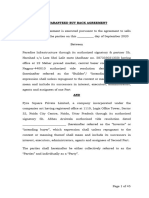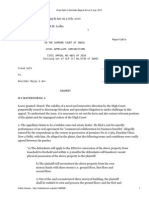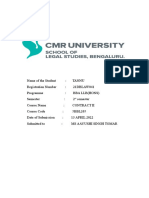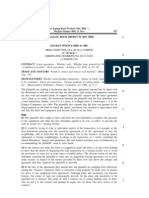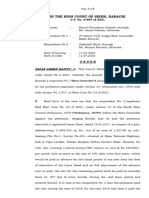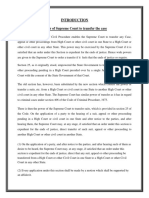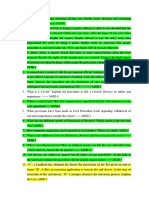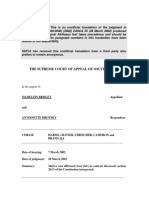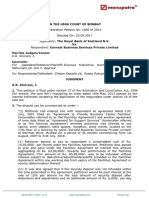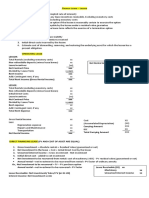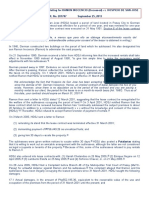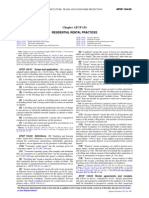Sri Amuruvi Perumal Devasthanam, ... vs K.R. Sabapathi Pillai And Anr. on 14 March, 1961
Uploaded by
punjabschooloflawwSri Amuruvi Perumal Devasthanam, ... vs K.R. Sabapathi Pillai And Anr. on 14 March, 1961
Uploaded by
punjabschooloflawwShare Link Desktop View
Free features Premium features Case removal
Take notes as you read a judgment using our
Virtual Legal Assistant and get email alerts
whenever a new judgment matches your query
(Query Alert Service). Try out our Premium Member
Services -- Sign up today and get free trial for one
month.
Warning on translation
Get this document in PDF
Print it on a file/printer
Select Language
Powered by Translate
Select the following parts of the judgment
Facts Issues
Respondent's Analysis of the
Arguments law
Court's
Precedent Analysis
Reasoning
Conclusion
For entire document
Mark above structure
Remove all markings
Learn how it works!
View how precedents are cited in this
document
Mark all precedents
View only precedents
Select precedent ...
Remove precedent markings
Learn how it works!
Filter precedents by opinion of the court
Accepted by
Relied by Party
Court
Negatively Viewed by No clear
Court sentiment
[Cites 20, Cited by 7]
Top AI Tags
agreement-to-do-impossible-act
transfer-of-property
User Queries
doctrine of frustration
frustration of contracts
section 56 contract act
transfer of property act section 108
doctrine of frustration of contract
commercial impossibility
section 56 contract
impossibility of performance
section 108(e) transfer of property act
transfer of property act
impossibility of contract
indian contract act
section 108 e transfer of property act
ex parte decree
fasli
"impossibility of performance"
transfer of property act section 108(e)
contract act
transfer of property
ex parte
Madras High Court
Sri Amuruvi Perumal Devasthanam, ... vs K.R.
Sabapathi Pillai And Anr. on 14 March, 1961
Equivalent citations: (1962)2MLJ452
JUDGMENT
Venkatadri, J.
1. This is an appeal by the plaintiff against the judgment
and decree in O.S. No. 49 of 1956 on the file of the Sub-
Court, Mayuram. The plaintiff Sri Amuruvi Perumal
Devasthanam at Teralandur, filed a suit for recovery of a
sum of Rs. 21,744-11-4, being arrears of lease payable by
the defendants. The learned Subordinate Judge,
Mayuram, decreed the suit for Rs. 7,422. Now the appeal
is filed for the disallowed portion of the claim by the
appellant.
2. The facts in this case are the following:
The plaintiff-devasthanam possesses the properties
described in schedules; A to A-2 to the plaint. At
the time of the suit the plaintiff was represented by
its trustee Sri Raghavan, who was validly
appointed by the Hindu Religious and Charitable
Endowments department. The devasthanam as
usual leased the suit lands in open auction held on
26th June, 1952, as per the Rules framed under the
Hindu Religious and Charitable Endowments Act
for three faslis, 1362, 1363 and 1364 (1952, 1953
and 1954) subject to the terms and conditions
prescribed in the lease auction notice. In the
auction held on 26th June, 1952, in the presence of
the inspector by the devasthanam authorities, the
second defendant was the highest bidder for 2,536
kalams of paddy and 323 bundles of straw as
annual rental for the said lands. The said bid was
accepted by the plaintiff-devasthanam and was
duly confirmed by the Commissioner, Hindu
Religious and Charitable Endowments, Madras.
Accordingly, a lease was executed on 31st August,
1952 by the plaintiff-devasthanam, which was then
represented by the Managing Trustee, N.
Subramania Pillai, and the defendants. Though the
second defendant was the highest bidder, the first
defendant also joined with the second defendant in
executing the lease-deed and has also given his
properties as security for the due performance of
the conditions of the lease. The main terms and
conditions of the lease are : (a) that the defendants
should deliver unconditionally 2,536 kalams of
paddy and 323 bundles of straw as rent due for
each of the faslis 1362, 1363 and 1364; (b) that the
defendants should not under any circumstances
claim any remission in the rent due and payable to
devasthanam authorities and (c) that the
defendants also have no right or claim to remission
on behalf of sub-tenants under their responsibility.
The plaintiff further states, that at the time when
the devasthanam properties were leased in open
auction on 26th June, 1952, the defendants were
also aware of the agrarian conditions prevailing in
the Tanjore district and the contemplation of the
Government to introduce a legislation in regard to
the quantum of the rent payable by the tenants to
their landlords. As expected, the Governor of
Madras promulgated Ordinance IV of 1952, called
the Tanjore Tenants and Pannaiyals (Protection)
Ordinance, 1952, on 23rd August, 1952.
Therefore, on the date of the execution of the
lease-deed, the defendants were aware of
Ordinance IV of 1952. After the execution of the
lease-deed the defendants committed default in
paying the full rent payable to the plaintiff with the
result that at the end of the lease there was a large
accumulation of arrears of paddy and bundles of
straw, which the plaintiff estimates at a sum of Rs.
21,744-11-4. After the expiry of the lease period,
the defendants surrendered possession of the
demised lands, but neglected to pay the arrears and
failed to comply with the terms of the lease-deed.
The plaintiff called upon the defendants to clear
the arrears due and payable by them to the
plaintiff-devasthanam but they did not accede to
the request with the result that the plaintiff filed
the present suit for the recovery of the said amount
from the defendants.
3. The defence set up by the respondents (defendants)
was that at the time when they entered into the lease
agreement with the plaintiff-devasthanam, Ordinance IV
of 1952, had come into force and the Ordinance was
subsequently repealed and replaced by a regular Act XIV
of 1952, called the Tanjore Tenants and Pannaiyals
Protection Act, 1952, which came into force on 21st
December, 1952, the result of which was that the tenants
were entitled to remain in possession of the lands and get
the benefits of the said Act. The defendants were not able
to do pannai cultivation nor collect the usual rents from
the tenants. On the other hand all the tenants filed
applications before the Conciliation Officer for fixation of
fair rent under the provisions of the said Act; the tenants
who were evicted by the defendants applied for
restoration of the land and some of the tenants claimed
remission on account of adverse season and also wanted
division of the produce according to the provisions of the
Act. In addition to this the defendants suffered loss on
account of the heavy cyclone on 30th January, 1952. The
defendants also stated that whatever amount they had-
-221/2| percent. for the years 1952-53 and a 15 per cent.
reduction for faslis 1363 and 1364--collected from the
tenants they had paid to the last pie to the plaintiff-
devasthanam. They claimed remission of rent for faslis
1363 and 1364. They denied their liability to pay the
arrears on account of the passing of the Act, XIV of 1952,
which prevented them from realising the contractual rent
from the tenants.
4. On these pleadings the learned Subordinate Judge of
Mayuram framed as many as eight issues of which the
important issues are:
(1) Whether the defendants are not liable to
measure the rent as per the lease-deed executed by
them to the plaintiff for all or any of the reasons
stated by them."
(2) Whether the defendants are entitled to a
remission of 221/2 per cent. in the rent agreed for
1952-53?
(3) Whether the defendants are entitled to 15 per
cent. remission in the rent agreed for faslis J363
and 1364?
5. The learned Subordinate Judge gave a finding that as
the defendants received only the fair rent under Act XIV
of 1952, from their sub-tenants, it was but just and proper
that the plaintiff-devasthanam should also receive the
same fair rent which the defendants have received from
their sub-tenants. In effect, he directed the plaintiff to take
from the defendants only whatever rent they have
collected from their subtenants under Act XIV of 1952.
He further held that the defendants are bound to pay to
the plaintiff only the fair rent fixed by the Conciliation
Officer and that the plaintiff was not entitled to claim
anything more than that, much less the rent fixed in the
rent deed, exhibit A-1. Finally, he gave a decree for a sum
of Rs. 7, 422-1-4 with proportionate costs and dismissed
the rest of the claim without costs. Now, as stated already,
the appeal is preferred by the plaintiff for the disallowed
portion of the arrears of lease payable by the defendant.
6. The question for our consideration in this appeal are (1)
whether the defendant are liable to pay the rent fixed in
the lease deed notwithstanding the promulgation of
Ordinance IV of 1952, which was subsequently repealed
and replaced by Act XIV of 1952, and (2) whether the
plaintiff-devasthanam is bound to receive only the fair
rent fixed by the Conciliation Officer.
7. Mr. Sundaralingam, the learned Counsel for the
appellant, contended that the defendants are bound to pay
the rent fixed under the lease-deed. The defendants were
aware of the conditions then prevailing in the district of
Tanjore. The subsequent promulgation of the Ordinance
after the defendants were declared the highest bidders in
the public auction will not relieve them from discharging
their obligations under the lease agreement entered into
between the defendants with the plaintiff devasthanam.
Further, the lease is an unconditional lease and they
should not claim any remission or concession in regard to
the rent payable to the devasthanam. The defendants had
taken full responsibility in realising the rent from the
tenants or taking possession of the lands themselves from
the tenants and do pannai cultivation. The plaintiff-
devasthanam is not at all concerned whether the
defendants were able to collect full rent or not,
8. Mr. Ramamurthi, learned Counsel for the respondents,
on the other hand, raised before us for the first time the
argument that there was an impossibility of performance
of the obligations by the defendants on account of the
sudden promulgation of the Ordinance IV of 1952, just
before the lease was executed and the subsequent passing
of the regular Act XIV of 1952 replacing the Ordinance.
His clients, according to him, were taken by surprise by
these statutes with the result that they were virtually
prevented from fulfilling the terms of the contract. The
tenants taking advantage of the provisions of the Act filed
an application before the Conciliation Officer and had the
fair rent fixed. The defendants were not able to do pannai
cultivation so as to enable them to pay the rent stipulated
in the rental agreement to the devasthanam. As they were
prohibited by the Act from collecting the contractual rent
from the tenants it has not become possible for them to
observe the conditions of the lease. In any event, they are
entitled to remission for the lease period as the plaintiff-
devasthanam itself promised at the time of the execution
of the lease-deed that it would settle the matter later even
though the Act might come into force.
9. In regard to the first contention of Mr. Ramamurthi,
that his clients were taken by surprise by the sudden
promulgation of Ordinance IV of 1952, and the
subsequent passing of Act XIV of 1952, we are not very
much impressed with his plea. At the relevant period
there were agrarian troubles, especially in the Tanjore
district. In the year 1950, the Government had appointed
a Committee headed by Mr. M. V. Subramaniam, I.C.S.,
to report on land reforms to be effected. He submitted his
report suggesting that the landlord's share of rent should
be 45 and that of the tenant. 55. The report was published
on 1st July, 1951.
10. In Santhanakrishna v. Vaithilingam the question that
arose for decision before a Bench of this Court consisting
of the learned Chief Justice and Venkatarama Ayyar, J.,
was the validity of the Tanjore Tenants and Pannaiyals
Protection Ordinance IV of 1952, which was modified by
Ordinances Nos. V and VI of 1952. Dealing with the
background for the Ordinances and Act XIV of 1952,
Venkatarama Ayyar, J., observed at page 1116:
The tenants all over the district started an agitation
that the recommendations contained in the
Subramaniam report should immediately be given
effect to. On the other hand, the landlords who
were deeply dissatisfied with the proposals
contained therein decided to stop the tenants and
start personal cultivation with hired labour
imported from Ramanathapuram and other
outlying districts. The tenants and pannaiyals, who
were thus frustrated in their attemps at getting
better terms, took to violence as a means of
achieving their ends. There were widespread
disorders resulting in theft, arson and murder and
proceedings had to be taken under the provisions
of the Criminal Procedure Code for maintaining
order and ensuring security of life and property. It
was during this state of emergency that the
Government promulgated on 23rd August, 1952,
Ordinance No. IV of 1952. The Preamble to the
Ordinance states that the relations between
landowners on the one hand and tenants and
labourers on the other had become strained, that
there were displacements of tenants and dismissal
of farm labourers resulting in agrarian crimes that
the situation threatened to cause deterioration in
agricultural production and that it was necessary to
take immediate action in regard to the matter. . .
This Ordinance, after having undergone
modifications and alterations under Ordinance
Nos. V and VI of 1952 was eventually replaced by
an Act of the Madras Legislature, called the
Tanjore Tenants and Pannaiyals Protection Act
(XIV of 1952) ...
In the face of the above observations made by
Venkatarama Ayyar, J., with regard to the
background for the Act, it is impossible to believe
that the defendants were taken by surprise and that
they were unaware that some legislation would be
introduced to settle the agrarian problem between
the landlords and the tenants. On the other hand,
we are convinced that the defendants must have
been aware on the date of the lease-deed of the
impending legislation in regard to the dispute
between the landlords and tenants.
11. Further, the defendants did not take the plea of
impossibility of performance in clear terms in the written
statement; nor did they put forth their case on the
principle of frustration before the learned Subordinate
Judge. We have seen the written statement and it is
impossible for us to say that the defendants took his
defence of impossibility of performance of contract in the
written statement. On perusing the judgment of the
learned Subordinate Judge carefully we are also
convinced that the Advocate for the defendants in the
lower Court did not at all advance his arguments, on the
lines now raised by Mr. Ramamurthi, that is, impossibility
of performance or in other words, the special defence of
frustration of contract, not pleaded by a party, the
opposite party gets no opportunity to show that frustration
was due to the neglect or default of the party pleading the
defence. The plea of impossibility of performance is one
form of discharge of contract as pleaded by Mr.
Ramamurthi. If the defendants really wanted to plead that
the contract was discharged on the principle of
frustration, they should have stated so in their written
statement. As pointed in Mulla's Civil Procedure Code
(Twelfth edition, Volume I), page 582:
. . . where he (the defendant) alleges that he is
released from or exonerated and discharged from,
the performance of his contract, he must in his
written statement give sufficient information to his
opponent as to how and when he was so released
or discharged.
12. In the first place, in the present case, the facts are not
set out clearly in the written statement to make out a case
of frustration. Secondly, the term ' frustration ' or
impossibility of performance, is nowhere used in the
written statement. Thirdly, it has not been argued in the
Court below. If the plea of frustration as discharging a
contract was specifically pleaded in the written statement,
the plaintiff would have taken the opportunity to show
that it is not a case of frustration or impossibility of
performance of the contract. He could have proved that
the doctrine of frustration of the contract fails because the
supervening event which is said to have made the
performance of the contract impossible was within the
contemplation of the members and was before their eyes.
As the defendants have not taken this definite plea of
impossibility of performance, we propose not to take
seriously this argument advanced by Mr. Ramamurthi. We
will, however, consider whether there was impossibility
of performance or whether the doctrine of frustration of
contract can be applied in the instant case.
13. According to Mr. Ramamurthi the facts to support the
theory of frustration or impossibility of performance are
that after the defendants entered into a lease agreement
with the plaintiff-devasthanam, Act XIV of 1952, came
into force with the result that the defendants were
prevented from collecting the contractual rent from the
tenants; they were prohibited from enforcing their terms
of the lease to their tenants, the tenants themselves took
advantage of the provisions of the Act by filing an
application before the Conciliation Officer for fixation of
fair rent and it has become impossible for the defendants
to comply with the terms of the lease agreement entered
into with the plaintiff-devasthanam.
14. Now we have to consider whether these facts are
enough in law to apply the theory of frustration or to
declare that the contract has become impossible of
performance. The principal thing to be considered by the
Court in each case is whether the parties agreed to be
bound by the contract notwithstanding supervening
circumstances in which case no question of frustration
arises. In the absence of such an agreement, the Court
must see how far the altered circumstances affect the
contract itself and the working of it. The nature and the
terms of the contract must be noted. Before applying the
doctrine, the first duty is to ascertain the facts forming the
basis of the contract and to see how far the change in the
circumstances is such as would remove the very
foundation of the contract itself. The Court must as a fact
determine whether the circumstances did exist and if so
whether they are sufficient to hold that the parties are
absolved from their obligations under the contract. It is
the essence of the doctrine that the event which causes
frustration must have occurred without the fault of either
party. Therefore, the Court ought to see whether it is a
case of self-induced frustration in which case there will
be no breach at all. The theory of frustration cannot be
applied in the instant case as there is no destruction of the
specific thing necessary in the performance of the
contract; nor can we say that the performance has become
impossible by reason of the incapacity of a party. The
defendants were aware of the promulgation of Ordinance
IV of 1952, when they entered into the agreement. The
relationship of landlord and tenant continued even after
the promulgation of the Ordinance and after the passing
of Act XIV of 1952. The defendants were not prevented
from collecting the rents from their tenants. The plaintiff
is not at all concerned with how the defendants collect the
rents from their tenants or in what manner the defendants
would settle the rents with the tenants and further the
plaintiff-devasthanam cannot be blamed if the provisions
of Act XIV of 1952 benefit the tenants and deprive the
defendants of their right to collect the contractual rent.
The defendants took the risk of entering into a lease with
the tenants when they knew full well that the Ordinance
had come into force. The plea of frustration in such a case
should fail. As observed by Lord Sterndale, M.R., in
Mertens v. Home Freeholds Company L.R. (1921) 2 K.B.
526, 538:
It has never been held that a man is entitled to take
advantage of circumstances as a frustration of the
contract if he has brought those circumstances
about himself.
Similarly in Maritime National Fish Ltd, v. Ocean
Trawlers Ltd. L.R.(1935) A.C. 524, 530, Lord
Wright laid it down at page 530:
the essence of ' frustration ' is that it should not be
due to the act or election of the party.
15. One of us, Jagadisan, J., had occasion to consider the
question of impossibility of performance or frustration in
Mahalingaswamy Devasthanam v. Sambanda I.L.R.
(1962) Mad. 273. There also a similar religious institution
like the plaintiff leased out a large block of lands
belonging to it to a lessee. The lessee executed an
unconditional lease-deed to the devasthanam. The lessee
committed default in payment of arrears of rent and a suit
was filed by the devasthanam for the recovery of the
arrears of rent. The lessee raised a defence similar to the
one now raised by the defendants that after the
promulgation of the Ordinance IV of 1952 and the
passing of Act XIV of 1952, he was not able to collect the
contractual rent from the tenants, as they had filed
applications before the Conciliation Officer for fixation of
fair rent. My learned brother Jagadisan, J., observed:
It must be mentioned even at the outset that having
regard to the terms of the lease deed Exhibit A-1 in
and by which the lessee undertook to pay the
stipulated rent unconditionally, despite Act of
State or God the Court has no power or
justification to relieve the lessee from the
obligations undertaken by him on what may be
called equitable grounds. The law on this subject
must now be held to have been finally laid down
by a recent decision of a Bench of this Court in
Appeal Suit No. 1172 of 1953, dated 2nd May,
1958..." Ramachandra Ayyar, J., who delivered the
judgment in that case observed as follows : ' It is
clear from the above decisions that the lessee
would be liable to pay in accordance with the
contract and that there is no power in Court to
relieve him against his obligations under it....' In
Velur Devasthanam v. S. Sundaram Nainar
Ramaswami , J., also held that, where the lease
was absolute and unconditional, the lessee was
liable to pay in accordance with the contract and
that there was no power in the Court to relieve him
against the obligation under it invoking any
equitable principles. The learned Judge followed
the decision of the Bench in Appeal Suit No. 1172
of 1953, referred to above. Therefore, it has now
been settled that the lessee is not entitled to any
remission merely because of the promulgation of
the Ordinance IV of 1952, and the passing of Act
XIV of 1952, after he executed the lease-deed in
favour of the plaintiff-devasthanam.
16. Then in regard to the contention about the
applicability of the doctrine of impossibility of
performance, Jagadisan, J., reviewed the case-law on the
subject and observed at page 276:
It cannot be contended in the present case by the
lessee that Madras Act XIV of 1952 rendered
impossible the fulfilment of his contract to pay
rent to the lessor, the devasthanam. The lessee is
not a cultivating tenant within the meaning of the
said enactment. He is a mere intermediary who,
having taken on lease a large extent of properties
as a commercial or speculative venture, was in
effect functioning as an Ijaradar or a farmer of rent
intending to make profit. The contract of lease
there -fore cannot be said to have become
impossible of performance or rendered unlawful
by the said enactment. On the plain terms of
Section 56 of the Indian Contract Act, it is clear
that the lessee cannot claim any relief under that
section.
17. A similar case was decided by a Bench of the Andhra
High Court consisting of Subba Rao, C.J. and
Jaganmohan Reddy, J. In that case, Mallayya v. Kondappa
Naidu (1958) 1 An.W.R. 180, the facts are : one
Venkataramanayya was the proprietor of Jammavaram.
Village. He executed a usufructuary mortgage of the said
village in favour of the plaintiff and the second defendant.
Subsequently the plaintiff purchased the right, title and
interest of the second defendant. Thereafter the plaintiff
leased the village to the defendant for a period of six
years. In the meantime the leased lands had been taken
over by the Government under Madras Estates (Abolition
and Conversion into Ryotwari) Act. When the plaintiff
filed a suit for the recovery of the rent due to him, the
defendants pleaded that it had become impossible for
them to perform the terms of the lease deed and therefore,
the suit was not maintainable. Subba Rao, C.J., who
delivered the judgment in that case, while considering the
question whether the defendants were relieved of their
obligations under the lease deed by reason of the
provisions of Section 56 of the Indian Contract Act,
referred to the view of the Supreme Court in Satyabrata
Ghose v. Mugneeram Bangur and Co and Anr. (1954)
S.C.J. 1 : (1954) 1 M.L.J. 1 : (1954) S.C.R. 310, which
was stated thus:
In deciding cases in India the only doctrine that we
have to go by is that of supervening impossibility
or illegality as laid down in Section 56 of the
Contract Act, taking the word ' impossible' in its
practical and not literal sense. It must be borne in
mind, however, that Section 56 lays down a rule of
positive law and does not leave the matter to be
determined according to the intention of the
parties.
According to their Lordships of the Supreme
Court, the doctrine of frustration as embodied in
Section 56 of the Contract Act should be invoked
only if the whole purpose or basis of the contract
was frustrated by supervening events. Subba Rao,
C.J., after referring to the above decision of the
Supreme Court, observed:
Even after the Acts came into force, the only result
of those Acts was that the ryots were liable to pay
only the statutory rent which could only mean that
the earlier rents were exhorbitant and the statutory
rate was the just one. The change in the machinery
of collection did not really affect any substantive
rights of the defendants. . . In the circumstances,
we cannot hold that the statutory changes
introduced were so fundamental as to be regarded
by law to strike at the root of the contract as a
whole.
18. Recently a Bench of Patna High Court in Badri
Narain v. Kamdeo Prasad , 55 incidentally considered the
question of frustration in a petition filed under
Representation of the People Act, 1951. There the
petitioner contended that the respondent held Ghatwali
tenures and they were disqualified as they held office of
profit under Section 7 of Representation of the People
Act. The respondent contended that with the acquisition
of Ghatwali tenure the office of Ghatwali lapsed and,
therefore, the respondents cannot be said to have held any
office of profit under the Government. In other words, the
respondent contended there is a frustration of contract,
and they cannot be said to have held office of profit. After
discussing the nature of the Ghatwali tenure and the effect
of acquisitions of these Ghatwali tenures, their Lordships
observed:
....having regard to the object and purpose of
Ghatwali tenures, the performance of the contract
cannot be deemed to be impossible or
impracticable. This legislative enactment cannot
be said to have wholly upset the very foundation
on which the parties reste their bargain. I need
hardly observe that if the foundation remains in
substance, the contract will continue to be capable
of performance. It is true that the changes
introduced by the recent enactment have caused
diminution in the amount of remuneration.
It is one thing to say that the profit or remuneration
has diminished and another thing to say that the
performance has been rendered impossible. The
decrease in the amount of remuneration has the
effect of rendering the contracts more burdensome.
But, to attract the doctrine of frustration,
burdensomeness is not the necessary
consideration; the impossibility of performance of
the contract is the true criterion.
...
In my considered judgment, notwithstanding the
acquisition of Ghatwali tenures by the State, both
the grant and the office of the Ghatwals subsist
even now, though in an altered form, and the
performance of the obligations under the contract
You might also like
- Paradise Infra Buyback Agreement - AmendedNo ratings yetParadise Infra Buyback Agreement - Amended45 pages
- Devtree Corp. LLP vs Bhumika North GardeniaNo ratings yetDevtree Corp. LLP vs Bhumika North Gardenia26 pages
- Gajanan Moreshwar Parelkar Vs Moreshwar Madan MantM420038COM936154No ratings yetGajanan Moreshwar Parelkar Vs Moreshwar Madan MantM420038COM9361546 pages
- Bafna_Motors_Private_Limited_vs_Amanulla_Khan_0505MH2022110522162800122COM450466No ratings yetBafna_Motors_Private_Limited_vs_Amanulla_Khan_0505MH2022110522162800122COM45046612 pages
- Kuwe V Vader (Civil Appeal No 2 of 2002) 2002 UGSC 7 (18 September 2002)No ratings yetKuwe V Vader (Civil Appeal No 2 of 2002) 2002 UGSC 7 (18 September 2002)25 pages
- Rattan Mehta and Another Versus Gayatri Shah and Others 2022 SCC OnLine Del 2620 P 29 - 31No ratings yetRattan Mehta and Another Versus Gayatri Shah and Others 2022 SCC OnLine Del 2620 P 29 - 3111 pages
- noordin-charania-walji-v-drake-semakula-1998-ugsc-8-15-july-199No ratings yetnoordin-charania-walji-v-drake-semakula-1998-ugsc-8-15-july-19917 pages
- Vinod Seth Vs Devinder Bajaj & Anr On 5 July, 2010No ratings yetVinod Seth Vs Devinder Bajaj & Anr On 5 July, 201019 pages
- Vedanta ltd v Shenzen Shandong Nucleqar PowerNo ratings yetVedanta ltd v Shenzen Shandong Nucleqar Power4 pages
- 18318_2007_33_1501_24337_Judgement_12-Oct-2020No ratings yet18318_2007_33_1501_24337_Judgement_12-Oct-202067 pages
- Pomal Kanji Govindji & Ors Vs Vrajlal Karsandas Purohit & Ors1988No ratings yetPomal Kanji Govindji & Ors Vs Vrajlal Karsandas Purohit & Ors198831 pages
- Shivdev Singh and Ors V. Sucha Singh and OrsNo ratings yetShivdev Singh and Ors V. Sucha Singh and Ors6 pages
- Sona Corporation India PVT LTD Vs Ingram Micro IndDE202003022016413680COM85190No ratings yetSona Corporation India PVT LTD Vs Ingram Micro IndDE202003022016413680COM8519010 pages
- Ramanand and Ors Vs Girish Soni and Ors 21052020 DE202010062015043218COM681787No ratings yetRamanand and Ors Vs Girish Soni and Ors 21052020 DE202010062015043218COM68178712 pages
- Power of Supreme Court To Transfer The CaseNo ratings yetPower of Supreme Court To Transfer The Case11 pages
- High Court of Sindh, Circuit Court, Hyderabad: R.A No.232 of 2004No ratings yetHigh Court of Sindh, Circuit Court, Hyderabad: R.A No.232 of 200410 pages
- Damodar Valley Corporation Vs KK Kar 12111973 SCs730026COM966732No ratings yetDamodar Valley Corporation Vs KK Kar 12111973 SCs730026COM9667327 pages
- Schwartz v. Irving Trust Co., 299 U.S. 456 (1937)No ratings yetSchwartz v. Irving Trust Co., 299 U.S. 456 (1937)6 pages
- Brisley V Drotsky (432-2000) (2002) ZASCA 35 (28 March 2002) - EnglishNo ratings yetBrisley V Drotsky (432-2000) (2002) ZASCA 35 (28 March 2002) - English34 pages
- HIGHLIGHTED Thomson - Press - India - LTD - Vs - Nanak - Builders - and - InvesNo ratings yetHIGHLIGHTED Thomson - Press - India - LTD - Vs - Nanak - Builders - and - Inves22 pages
- W Epdw Ukmtq3 D0335B10 Yes: MANU/SC/0257/1963No ratings yetW Epdw Ukmtq3 D0335B10 Yes: MANU/SC/0257/19634 pages
- 255-rajbir-v-suraj-bhan-28-feb-2022-411526No ratings yet255-rajbir-v-suraj-bhan-28-feb-2022-4115267 pages
- Anthony Vs KC Ittoop and Sons and Ors 21072000 SC0611s000387COM968630No ratings yetAnthony Vs KC Ittoop and Sons and Ors 21072000 SC0611s000387COM9686306 pages
- Heera Traders Vs Kamla Jain 22022022 SCSC20222402221020183COM939419No ratings yetHeera Traders Vs Kamla Jain 22022022 SCSC20222402221020183COM93941928 pages
- Nouman_Ashraf_Vs__Sardar_Nazar_Muhammad_Khan_and_othersNo ratings yetNouman_Ashraf_Vs__Sardar_Nazar_Muhammad_Khan_and_others10 pages
- Abdul Razak Bin Datuk Abu Samah V Shah AlamNo ratings yetAbdul Razak Bin Datuk Abu Samah V Shah Alam10 pages
- The - Royal Bank - of - Scotland - NV - Vs - Earnest - Business - MH2017091017162407329COM584482No ratings yetThe - Royal Bank - of - Scotland - NV - Vs - Earnest - Business - MH2017091017162407329COM5844826 pages
- Judgment of The Court: 14 February & 21st May, 2024No ratings yetJudgment of The Court: 14 February & 21st May, 202420 pages
- LL and Company Development and Agro-Industrial Corporation v. Huang Chao ChunNo ratings yetLL and Company Development and Agro-Industrial Corporation v. Huang Chao Chun8 pages
- Soccer (Football) Contracts: An Introduction to Player Contracts (Clubs & Agents) and Contract Law: Volume 2From EverandSoccer (Football) Contracts: An Introduction to Player Contracts (Clubs & Agents) and Contract Law: Volume 2No ratings yet
- 1703 - Facility Perspectives v502 LOWRESNo ratings yet1703 - Facility Perspectives v502 LOWRES84 pages
- Karnataka Minor Mineral Concession Rules, 1994No ratings yetKarnataka Minor Mineral Concession Rules, 199446 pages
- Information - For - Tenants - PDF - Abdulrahman YousufNo ratings yetInformation - For - Tenants - PDF - Abdulrahman Yousuf16 pages
- Chapter ATCP 134: Residential Rental PracticesNo ratings yetChapter ATCP 134: Residential Rental Practices5 pages
- UNIVERSITY OF THE PHILIPPINES vs. CITY TREASURER OF QUEZON CITYNo ratings yetUNIVERSITY OF THE PHILIPPINES vs. CITY TREASURER OF QUEZON CITY2 pages
- Declaration of Covenants - Gwynedale - 01No ratings yetDeclaration of Covenants - Gwynedale - 0136 pages
- G.R. Nos. 182915 - 189658 - Sy v. Fairland Knitcraft Co., IncNo ratings yetG.R. Nos. 182915 - 189658 - Sy v. Fairland Knitcraft Co., Inc23 pages
- Do-All Metals Industries, Inc. v. Security Bank CorpNo ratings yetDo-All Metals Industries, Inc. v. Security Bank Corp5 pages
